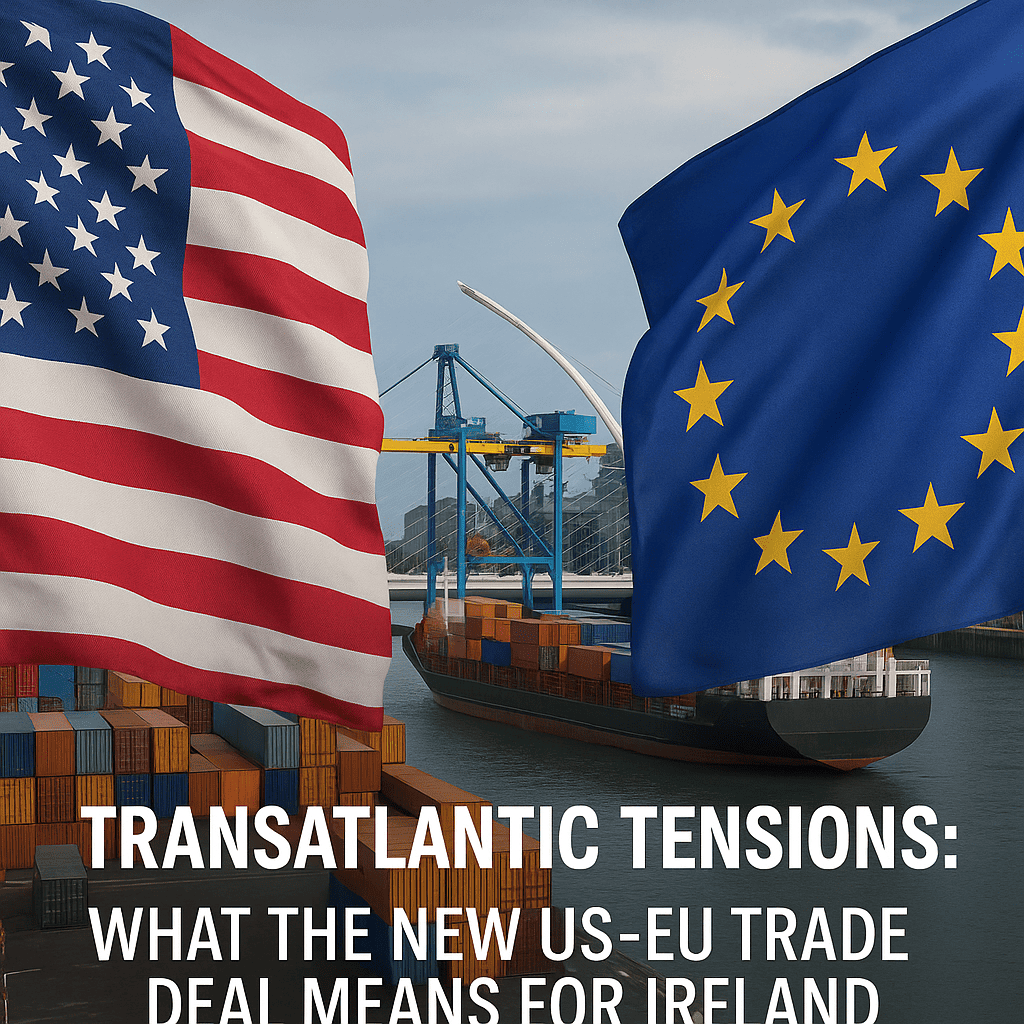What the Survey Revealed
Almost half of American companies operating in Europe believe that transatlantic trade and investment ties will deteriorate. This is the result of a September survey by the American Chamber of Commerce to the EU (AmCham EU).
- 46% of companies expect worsening relations.
- In January, the figure was nearly double at 89%.
33% now expect stability, largely thanks to a new US-EU trade agreement signed at the end of July.

The New Trade Deal: Step Forward or Delayed Crisis?
The July agreement was a much-needed compromise after months of escalating tension.
- For the US: The EU removed most duties on American goods, including agriculture and industrial exports. For US producers, this move preserved access to the lucrative European market.
- For the EU: The United States kept 15% tariffs on most European exports, covering everything from machinery to food products. This continues to weigh heavily on exporters in Germany, France, Italy — and Ireland.
In practice, the deal prevented a collapse in relations but did not resolve the deeper disputes. That’s why business leaders describe it as “averting catastrophe” rather than ushering in a new era. Economists see it as a pause — buying time for policymakers to find a more durable long-term balance.
What Companies Still Fear
Despite the deal, most companies surveyed still report anxiety:
- 60% expect negative impacts from Washington’s policies.
- 56% share similar concerns about new EU regulations.
- The number one priority remains lowering tariffs, but non-tariff barriers — such as EU rules on deforestation, supply chains, and sustainability — are increasingly on the radar.
Ireland’s Stakes in the Deal
For Ireland, this is not an abstract policy dispute between Brussels and Washington. The consequences are immediate and concrete.
The removal of EU duties on US imports keeps American goods flowing into Irish shops and supply chains. At the same time, Washington’s decision to maintain a 15% tariff wall against most EU exports poses a real threat to sectors we depend on — pharmaceuticals, dairy, and agri-food.
Business leaders in Dublin describe the deal as having “averted catastrophe.” Without it, investor confidence could have faltered, undermining Ireland’s carefully built image as the gateway for US companies into the European Union. Our role as a launchpad for tech giants and pharma multinationals depends on preserving predictability.
Still, much remains unsettled. Non-tariff barriers — especially new EU “green rules” on deforestation and sustainable supply chains — are likely to affect Ireland sooner than others. Our agri-sector, already under pressure, may feel the weight of these regulations first.
Why This Matters Now
This debate comes at a fragile time. Europe is still navigating inflation, high energy costs and geopolitical instability. In such an environment, steady trade with the United States is not just desirable — it is essential.
For Ireland, the stakes are even higher. With more than 800 American companies rooted here, employing tens of thousands, our prosperity is tied directly to the health of transatlantic relations. When US firms hesitate, it is Irish jobs and tax revenues that hang in the balance.
And in the global picture, there’s more than Washington and Brussels at play. While the two argue over tariffs and regulations, China continues to strengthen its hold on global supply chains. A fractured US-EU partnership risks leaving both sides weaker.
The Road Ahead
AmCham EU has made its message clear: the path forward must include cutting tariffs further, dismantling non-tariff barriers, and recognising each other’s standards.
For Ireland, this isn’t about abstract policy papers. It’s about protecting jobs in Cork, sustaining engineering hubs in Dublin Docklands, and supporting farmers in Tipperary. It’s about ensuring that Ireland remains not just relevant, but indispensable, as the bridge across the Atlantic.
